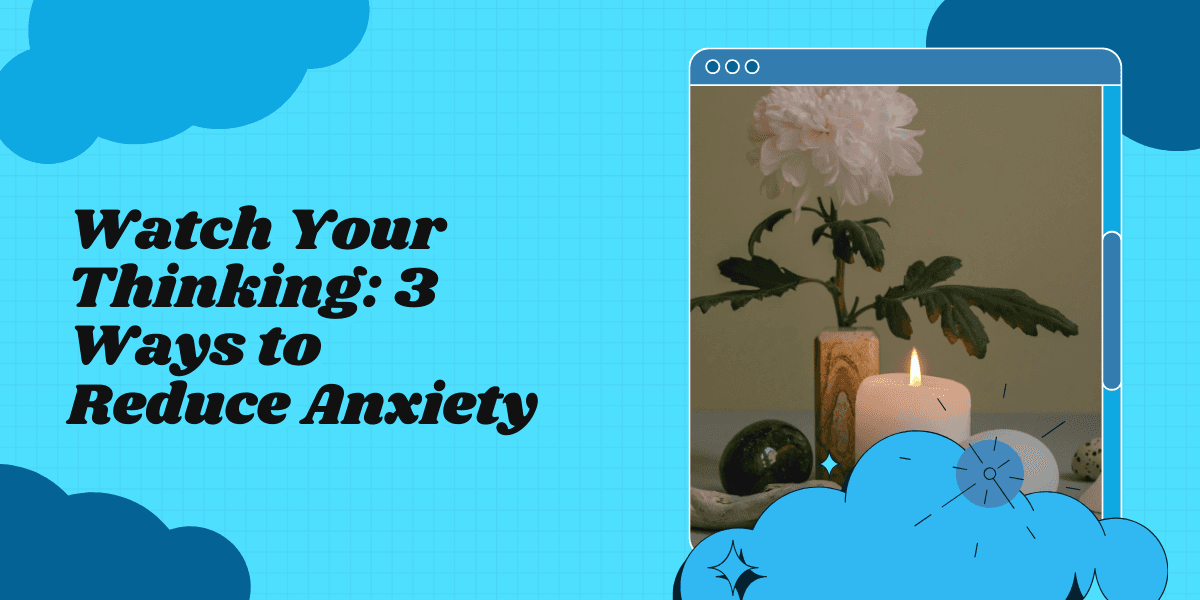Watch Your Thinking – 3 ACT Ways To Reduce Your Anxiety

Acceptance Commitment Therapy (ACT) is a unique approach to manage our anxious thoughts and feelings. One major element of ACT is teaching people how to handle pain, anxiety more effectively using mindfulness skills
Does your mind ever say things like….
“This Is Bad. I Can’t Do This. This Is It. Why Does This Happen Only To Me? What Are They Going To Think Of Me? I Am Not Cut Out For This Work. I Can’t Handle It. I Am Dumb. Why Is This Difficult? I Shouldn’t Think This Way. I Can’t Control Anything.”
You’re At The Right Place! Let’s Go Through How We Can Calm Ourselves And Worry Less About The Future!
1) I’M HAVING THE THOUGHT THAT ……..
This first technique is said to be very effective with patients
This first technique has been very effective with my patients.
- Put your negative self-judgment into a short sentence—in the form “I am X.”
For example, I’m a loser or I’m not smart enough.
- Now fuse with this thought for ten seconds. In other words, get all caught up in it and believe it as much as you possibly can.
Rate your anxiety from 1-10, 10 being very anxious.
- Now silently replay the thought with this phrase in front of it: “I’m having the thought that ...” For example, I’m having the thought that I’m a loser.
- Now replay it one more time, but this time add this phrase “I notice I’m having the thought that ...”
For example, I notice I’m having the thought that I’m a loser.
Rate your anxiety again. Even though it is just a mild difference, something is better than nothing!
2) SINGING AND SILLY VOICES
- Put your negative self-judgment into a short sentence—in the form “I am X”—and fuse with it for ten seconds. Rate your anxiety.
- Now, inside your head, silently sing the thought to the tune “Happy Birthday.”
- Hear it in the voice of a movie or cartoon character or a sports commentator.
What happened that time?
Did you notice a sense of separation or distance from the thought? If not, run through the exercise again with a different thought.
DISCLAIMER : Be wary of the thoughts you use this for. Validate your pain and nervousness. This might not be applicable for all kinds of thoughts.
3) TITCHENER’S REPETITION
This exercise (Titchener, 1916) involves three steps:
- Pick a simple noun, such as “lemon.”
Say it out loud once or twice, and notice what shows up psychologically—what thoughts, images, smells, tastes, or memories come to mind.
- Now repeat the word over and over out loud as fast as possible for thirty seconds— until it becomes just a meaningless sound. Please try this now with the word “lemon,” before reading on. You must do it out loud for it to be effective.
- Now run through the exercise again with an evocative judgmental word—a word that you tend to use when you judge yourself harshly
For example, “bad,” “fat,” “idiot,” “selfish,” “loser,” “incompetent,”—or a two-word phrase such as “bad mother.”
Please try this now and notice what happens. Most people find the word or phrase becomes meaningless within about thirty seconds. Then we see it for what it truly is: an odd sound, a vibration. Your harsh words over a period of time then will provoke less and less anxiety.
There are other meditative and visualisation techniques which focuses on allowing the thought to come and go, focusing on the sensations and experiences. However these are most effective when done by a trained therapist.
Related Articles

Letting Go With Grace: Emotional Tools for Closure
Letting go is never easy. Whether we are parting ways with a loved one, ending a relationship, leaving a job, or saying goodbye to a cherished chapter of life, the emotional weight can feel overwhelming. Yet, closure is essential for our emotional well-being. Without it, we carry unresolved grief, anger, regret, or longing that can seep into new relationships and experiences, holding us back from healing and growth.

Breakup Blues: How to Cope and Rebuild Your Self-Worth
A breakup often feels like a silent earthquake—unseen by others but devastating within. The pain doesn’t just come from the loss of a relationship, but from the crumbling of the life, identity, and future you built with another person. You may find yourself questioning your worth, doubting your value, and feeling isolated even when surrounded by people. In Indian society, where emotional expression is often discouraged and breakups can be stigmatized, this pain may feel even more overwhelming. But the truth is—while breakups may shake you, they do not define you. You are not broken; you are in a process of emotional reformation. And with the right tools, guidance, and support system, you can rebuild not just your self-worth but also your entire life narrative.

Healing After Heartbreak: A Mental Health Perspective
Heartbreak doesn't just break your heart—it can shatter your sense of identity, peace, and purpose. Whether the end was expected or abrupt, mutual or one-sided, short-lived or long-term, the aftermath often leaves people emotionally disoriented. In Indian culture, where societal expectations and family involvement in romantic relationships are prevalent, the pain is not just personal—it is public. Yet, very few are taught how to heal from emotional loss in a healthy, sustainable way.

Boundaries in Love: Saying ‘No’ Without Guilt
Love, in its truest form, should be a safe space—a space where individuality is not only respected but celebrated. Yet, in many relationships, especially in the Indian cultural context, love is often misunderstood as constant availability, complete sacrifice, and putting the other person first, always. As noble as this may sound, this version of love often leads to emotional exhaustion, suppressed resentment, and the erosion of one’s identity.

Gaslighting in Relationships: What It Is and How to Heal
Gaslighting is a form of emotional abuse that erodes your ability to trust your own perception. It’s a slow, insidious process that often begins with subtle doubts and ends with complete self-questioning. In romantic relationships—especially in the Indian context where silence, compromise, and duty are often mistaken for love—gaslighting can be even harder to recognize.

How Depression Can Affect Your Relationship—And What You Can Do
Depression is not just an internal struggle—it ripples outward, affecting relationships, routines, and the emotional fabric that holds people together. When someone is dealing with depression, it's not only their world that becomes dim—it can cast a shadow over their most intimate connections too. In a country like India, where open conversations about mental health are still rare and love is often equated with endurance, depression within a relationship can become invisible, misunderstood, or misjudged.
